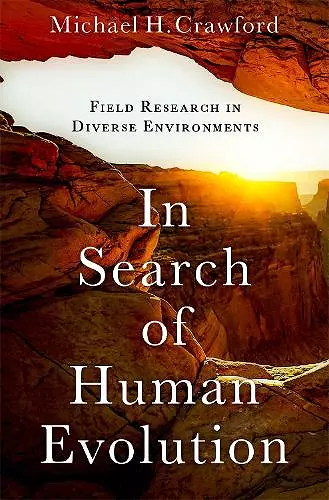In Search of Human Evolution
Field Research in Diverse Environments
Format:Hardback
Publisher:Oxford University Press Inc
Published:29th Aug '24
Should be back in stock very soon

Why would a researcher be willing to subject themselves to scorching heat, frigid conditions, or swarms of Anopheles mosquitoes? For author Michael H. Crawford, the answer is clear. Field research in anthropological genetics helps us answer several basic, universal questions. Who are we? Where did we come from? How did we get here? In Search of Human Evolution synthesizes more than 50 years of Crawford's research on the effects of migration on the evolution of human populations relocated to a series of unique environments. It documents the history of the field of anthropological genetics from its inception in 1973, through the information/computer revolution of the 1980s to the development of molecular characterization of human populations and the sequencing of the human genome. Crawford focuses on various facets of human evolution and migration in eight distinctive regions of the world, including sub-Arctic islands, tropical islands and coastal regions in the northern Caribbean, high valleys and arid regions in Mexico, the Artic taiga, and the plains of the Midwestern United States. Throughout the book, Crawford provides an overview of the importance of conducting fieldwork and the ethics of field research. He examines why individuals and communities participate in such research, and what the future of field research is in these times of epidemics and political instability.
This volume is intended for graduate students, with the aim of instructing them on how to set up research projects and how to respectfully conduct research on human subjects. * Choice *
Although the volume is certainly enjoyable and accessible for anthropology enthusiasts outside of the field, it truly shines brightly for young scientists, meticulously detailing every step of a successful research project; from planning to execution and conclusion. And it does so without omitting unforeseenturn of events, unexpected challenges, and the occasional readjustment of means and objectives, highlighting the importance of making a virtue out of necessity under some circumstances. As a young molecular anthropologist who has conducted most of his research sitting in front of a computer, I cannot help but shed one or two nostalgic tears thinking of the adventurous life that anthropologists experienced just decades ago. * Leonardo Vallini, The Quarterly Review of Biology *
ISBN: 9780197679401
Dimensions: 241mm x 160mm x 18mm
Weight: 431g
208 pages